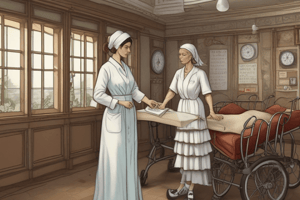Podcast
Questions and Answers
What does the term 'theoria' mean?
What does the term 'theoria' mean?
speculate
Nursing knowledge is distinct from medical knowledge according to Nightingale.
Nursing knowledge is distinct from medical knowledge according to Nightingale.
True (A)
Who envisioned nurses as a body of educated women?
Who envisioned nurses as a body of educated women?
Florence Nightingale
Which of the following is NOT a characteristic of theories?
Which of the following is NOT a characteristic of theories?
What is the significance of nursing theory?
What is the significance of nursing theory?
What report revealed that nursing lacked conceptual connections during the mid 1970s?
What report revealed that nursing lacked conceptual connections during the mid 1970s?
In which historical era was the transition from vocation to profession noted?
In which historical era was the transition from vocation to profession noted?
Which nurses were recognized for their theoretical writings?
Which nurses were recognized for their theoretical writings?
The discipline is dependent upon __________.
The discipline is dependent upon __________.
Flashcards are hidden until you start studying
Study Notes
History of Nursing Theory
- The term "theory" is derived from “theoria,” which involves speculation.
- Florence Nightingale envisioned nurses as educated women during the mid-1800s, when public service roles for women were limited.
Characteristics of Theories
- Theories interrelate concepts to provide a new perspective on various phenomena.
- Theoretical frameworks must maintain a logical structure.
- A successful theory should be simple yet capable of generalization across contexts.
- Theories serve as the foundation for testable hypotheses.
- Theories contribute to the advancement of knowledge within nursing through research validation.
- Practitioners can use theories to enhance and guide their nursing practice.
- Any theory should align with other validated theories while leaving room for further investigation.
Historical Eras of Nursing Education
- Curriculum Era: Shifted nursing education from hospital diploma programs to colleges and universities; marked transition from vocation to profession.
- Research Era: Established nursing practice based on scientific research, emphasizing the need for theoretical frameworks in nursing curricula during the 1980s.
- Graduate Education Era: Emergence of master's programs to fulfill the demand for specialized nursing education; included nursing theory and conceptual models.
- Theory Era: Focus shifted from merely developing theories to applying them in practice, establishing nursing science through the integration of research.
The Significance of Nursing Theory
- Nursing theoretical works encapsulate comprehensive and systematic knowledge, essential to the discipline's growth.
- Conceptual frameworks are crucial in formulating and designing research within nursing.
- Renowned nursing scholars such as Henderson, Nightingale, Orlando, Peplau, and Wiedenbach made significant contributions to nursing theory.
- Nursing as a discipline relies heavily on theoretical foundations to explain and describe practices within the profession.
Studying That Suits You
Use AI to generate personalized quizzes and flashcards to suit your learning preferences.




